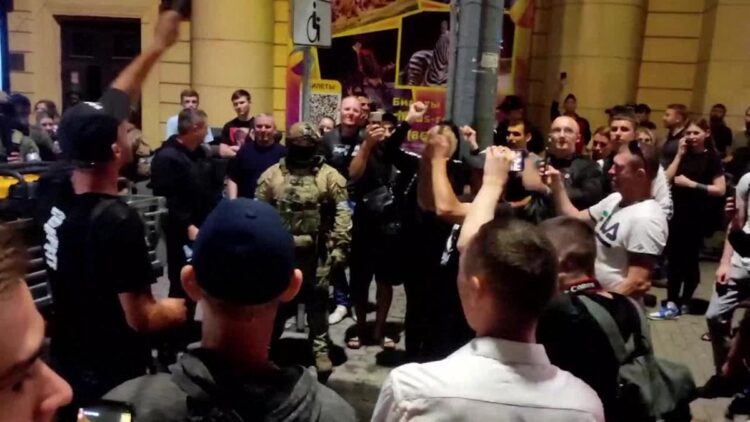The chief of the rebel Wagner mercenary force called off his troops’ advance toward Moscow on Saturday, easing Russia back from its most serious security crisis in decades.
The feud between Wagner chief Yevgeny Prigozhin and Russia’s military brass came to a violent head in the past day, with his forces capturing a key army headquarters in southern Russia and then heading north to threaten the capital.
Within hours of Prigozhin’s about-face, the Kremlin announced he would leave for Belarus and Russia would not prosecute either him or the group’s members.
It had been a dramatic day of developments, with President Vladmimir Putin warning against civil war, Moscow telling locals to stay off the streets and Kyiv revelling in the chaos engulfing its enemy.
The tide turned suddenly when Prigozhin made the stunning announcement that his troops were “turning our columns around and going back to field camps”, to avoid bloodshed in the Russian capital.
Prigozhin, who has feuded bitterly with Moscow’s military leadership even as his outfit led parts of Russia’s Ukraine offensive, said he understood the importance of the moment and did not want to “spill Russian blood.”
By Saturday evening Wagner began pulling back its fighters and equipment from the military headquarters the group had occupied earlier in southern Rostov-on-Don, according to an AFP reporter at the scene.
Authorities in the southern Lipetsk region announced the lifting of restrictions after earlier reporting Wagner fighters in their territory, where the local capital is just 420 kilometres (260 miles) south of Moscow.
Belarusian leader Alexander Lukashenko said he had negotiated a truce with Prigozhin “on stopping the movement of armed individuals from the Wagner group on Russian territory and further steps on de-escalating tensions.”
Kremlin spokesman Dmitry Peskov later told reporters that the “criminal case against him (Prigozhin) will be dropped. He himself will go to Belarus.”
Peskov also said that members of Wagner who had taken part in what authorities termed an “armed rebellion” will not be prosecuted.
Earlier Saturday, Kyiv had been revelling in the chaos that engulfed its enemy.
“The man from the Kremlin is obviously very scared and is probably hiding somewhere,” Ukraine’s President Volodymyr Zelensky said in his daily address, adding that Putin has “created this threat himself”.
Separately, Ukraine’s deputy defence minister Ganna Malyar announced that Ukrainian forces had gained more ground in the eastern region of the Donbas, launching new counteroffensives in several areas.
Putin’s spokesman insisted the Russian leader continued to work in the Kremlin and had not fled Moscow.
– Russian blood –
Before Prigozhin’s climbdown, Russian regular forces had launched what one regional governor called a “counter-terrorist operation” to halt the Wagner advance northwards up a main highway towards Moscow.
In the capital, the mayor urged Muscovites to stay indoors and declared Monday a day off work.
“The situation is difficult. I ask you to refrain from travelling around the city as much as possible,” Mayor Sergei Sobyanin said in a statement, warning of possible road closures.
Prigozhin had announced that his troops had taken control of the military command centre and airbase in the southern city of Rostov-on-Don, the nerve centre of Russia’s offensive in Ukraine.
“We got to Rostov. Without a single shot we captured the HQ building,” he said, claiming that local civilians had welcomed the operation and vowing to overthrow Russia’s military command.
Responding to the challenge in a televised address, Putin accused Prigozhin — whose private army provided shock troops for Moscow’s offensive in Ukraine — of a “stab in the back” that posed a threat to Russia’s very survival.
– ‘Harsh measures’ –
“Any internal turmoil is a deadly threat to our statehood and to us as a nation. This is a blow to Russia and to our people,” Putin said, demanding national unity.
“Extravagant ambitions and personal interests led to treason,” Putin said, referring to Prigozhin, who began building his power base as a catering contractor.
“All those who consciously stood on the path of betrayal, who prepared an armed rebellion, stood on the path of blackmail and terrorist methods, will suffer inevitable punishment, before the law and before our people,” Putin vowed.
Another Putin ally, Chechen strongman Ramzan Kadyrov, declared that he had dispatched his own units to help quash the Wagner rebellion.
“The rebellion must be put down, and if harsh measures are necessary, we are ready!” he warned.
Latvia announced that it was tightening security on its Russian border and would not admit refugees fleeing the chaos.
– ‘Civil conflict’ –
After Putin’s speech accusing him of treason, Prigozhin launched a second broadside.
“On treason of the motherland: the president is deeply wrong. We are patriots of our motherland,” Prigozhin said. “Nobody plans to turn themselves in at the request of the president, the FSB or anyone else.”
Armed Wagner fighters deployed around administrative buildings in Rostov and tanks were seen in the city centre.
As the insurrection force headed north through Voronezh and Lipetsk towards Moscow, the capital’s mayor announced that “anti-terrorist” measures were being taken.
Critical facilities were “under reinforced protection”, TASS reported, citing a law enforcement source.
While Prigozhin’s outfit fought at the forefront of Russia’s offensive in Ukraine, in recent months it has engaged in a bitter feud with Moscow’s military leadership.
He repeatedly blamed Defence Minister Sergei Shoigu and Valery Gerasimov, chief of the general staff, for his fighters’ deaths.
bur-dc/jmm/jj
[ad_2]
Source link







